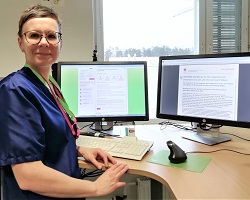Katja Soininen – providing health care services in the digital age

Katja Soininen
“We nurses are always working to empower patients, and sometimes we tend to see ourselves as the main actors in people’s health. But really, patients themselves are the protagonists and digital health technologies can empower them in their self-care,” says 40-year old Katja Soininen, an electrophysiology nurse finishing up her Master’s degree in digital health at Kuopio University Hospital in Finland.
Digital services connecting patients and health care professionals
Kuopio University Hospital is part of the Health Village project, a patient-oriented digital health care service set up by various university hospitals in Finland.
“I have been involved in the online platform, Health Village, throughout the last two years while studying for my Master’s degree,” says Katja. “The platform, co-developed with patients, allows for the creation of digital care paths linking health care professionals with the patients they support. Health Village enhances communication between the users and providers of health care services.
“The platform also helps people plan and manage their own care. Patients can monitor their health using simple medical devices and send readings on blood pressure, heart rate and weight measurements to us. They can keep an electronic journal to track their symptoms, and we can message them, answer questions and give advice. This means we can help patients more efficiently.”
Health services any day, anytime, anywhere
Katja, who has worked in various cardiology nursing positions since 2003, says she works daily with technology.
“Imagine a pregnant woman with gestational diabetes. She may be at work during the day and only have time to consult a health care professional once she has put her children to bed. Thanks to digital services, she can update her data at any time of day or night, request information or receive assistance.
“Improved access to health services also means taking into consideration that many elderly people are not comfortable with using digital services – they need to be coached about this option. We also have to think about people with limited hearing or vision.
“With digital care we can reach everyone, regardless of where they live. This is very important especially here in eastern and northern Finland where distances are vast.”
Digital literacy for all
“As ground-breaking as digital care is, I don’t think that in-person care will ever become redundant…,” Katja pauses briefly, “but then again, people bond over the Internet all the time, so there is the possibility that patients and doctors may find other ways of interacting in a digital world,” she says.
Talking about the future, Katja has clear ideas. “I want to find new ways to help people and empower them. It is also important that professionals understand the possibilities that digital innovations offer. I want to work with colleagues and patients to develop digital services to offer better care.
“We need to develop new digital tools not only for, but also with, patients. When we started the digitalization process for our heart patients, they were involved from the very start and continue to remain so.
“It is imperative that health care professionals are educated in digital health care. In the future, digitalization will perhaps be on the syllabus for all health care studies. We all need to become more digitally literate.”
Enhancing the digital skills and competencies of the health workforce is one of the topics that will be discussed at the symposium on the Future of Digital Health Systems 2.0, to be held in Copenhagen.



